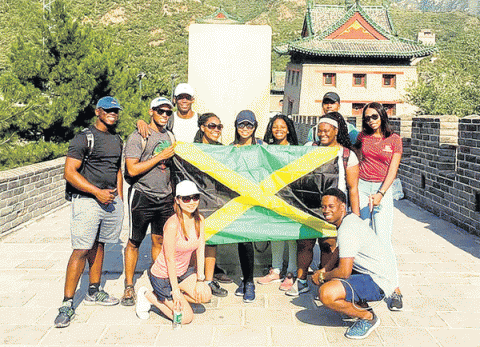
CONTRIBUTED PHOTOS
IN 2008, the Seeds for the Future initiative was established by Huawei.
Based in Shenzhen, China, the three-week immersive programme gives participants across 100 countries the opportunity to learn about Huawei’s international business culture at the company’s headquarters.
Since 2017, Huawei Jamaica has also been involved in the global programme, in collaboration with The University of the West Indies and the University of Technology, benefiting many students. Huawei selects 10 top college students for a study trip to China, where the course of the programme focuses on information communication technology (ICT) expertise and helps to fuel the development of local ICT industries.
Among the students in the latest batch were Tia Thomas and Nathan Downer from the University of Technology, Jamaica, and The University of West Indies, respectively. Both students described their trip to China as a fascinating one, expressing gratitude for the exposure to the Chinese language, food, expertise, and the opportunity to meet other participants from various countries
CULTURE SHOCK
A normal phenomenon for tourists is culture shock. For some, it would probably be the squat toilets or the strong family connections that China has. However, for Nathan, it was merely the restaurant practices. “One of the biggest cultural shocks has to do with dining out. In the West, we are used to leaving tips after finishing a meal, but that is looked down on in China. Also, I found it interesting that, culturally, it is a good thing to have food left back on your table. Many times, we’d walk past tables in a restaurant and see numerous plates with food left back. We learnt that this was a positive message to the owners of the restaurant, telling them that their serving portions are bountiful. In the West, leaving food behind in such a manner is usually a sign that the quality or flavour of the meal was unpalatable,” Nathan said.
Adjusting to the language barrier, cultural differences, the dry air of the capital, Beijing, and noticing how discreet Chinese are, he was also impressed that the Huawei executives did not prevent students from exploring the cutting-edge technologies in China.
Huawei contributes to the appreciation of technology in China by providing goods and services to improve business operations, bringing simplicity and comfort to personal lives. The majority of the infrastructure needed to enable the devices residents use, including the cell towers providing 4G and 5G connectivity, as well as routers, are all provided by the telecoms giant. They also provide major cities like Shenzhen with more than 80 per cent of the cameras monitoring activity on the streets to keep people safe, constantly exploring new ways to improve what they offer.
“In terms of exposure, Jamaica is not as exposed to ICT and the vast benefits it provides in comparison to China. For this reason, I believe Jamaica does not have as much appreciation for ICT as China, because its capabilities are not fully known and explored,” Tia expressed. “In reality, affordable technology is not as available in Jamaica as it is in China, and the average Jamaican might not know the extent of what technology can do for them. Additionally, I will say that the use of technology is more widely accepted in China. For instance, regardless of where you go, you can use WeChatPay to pay for goods and services, even government services,” she continued.
DEVELOPING LOCAL ICT TALENT
The Global CSR flagship programme seeks to develop local ICT talent, enhance knowledge transfer, and promote a greater understanding and interest in the telecommunications sector, all while improving and encouraging regional build-up and participation in the digital community.
“I believe the most beneficial thing gained was the coming together of the students from the five countries. Through the Seeds for the Future programme, we were able to meet people from Mexico, the Dominican Republic, Egypt, and Vietnam. We were not only able to learn about their respective cultures, we were also able to be inspired by each other’s stories and accomplishments, and occasionally put our heads together to do some problem-solving. Globalisation is a big part of the world we live in, so being able to work with others from around the world will be extremely beneficial in solving issues that affect the world at large. If we pair that with the infrastructure that Huawei provides, I foresee a lot of problems being solved in the future,” Nathan ended.

